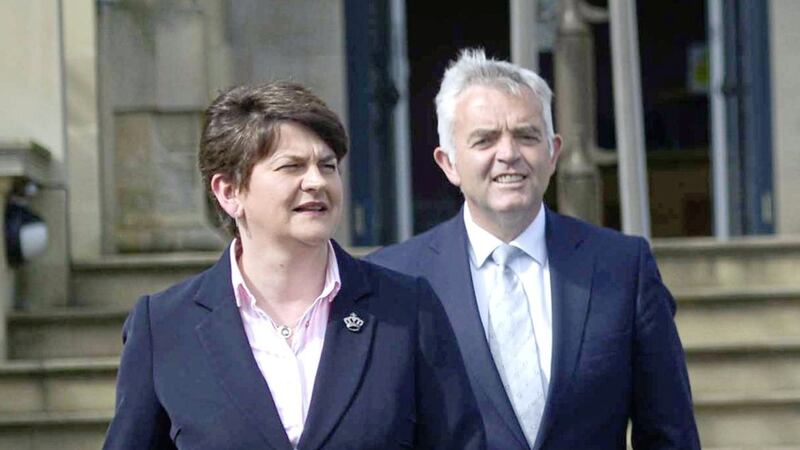Oh, the wreckage. The DUP have always been an unpleasant bunch but do they not bleed?
Now the unelected but all-powerful and grossly overpaid inner core is out in the open, shorn of pretensions if not of power. A wealth of embarrassments spills from the RHI inquiry. The cry of ‘traitors’ goes up and there may be tapes to come, as if countless warm chickens were not enough. Sex, lies, but please let there be no videotape. Breakfast at Tiffany’s ‘jumped the shark’, as it seems show-runners are said to do when they push long-running series into unreality. Any decent one would throw this story back.
Us onlookers have to laugh though there should be no doubt that ‘we the people’, still much invoked as though ‘we’ are solely Brexiteer unionists, are angry; the laughter is bitter. It is obvious all the same that the wreckage has a human side.
Revelations of wrong-doing and back-stabbing pour from people who no time ago were bound together by ‘all agin the stranger’. If this party contained genuine friendships, not just arrangements to guard backs, trust must be ruined beyond repair. The fallout will have already sifted into cracks in the armour, solidifying with every passing day and the approach of more sworn testimony.
Now it is clear beyond disguise that DUP centralised control at Stormont absorbed the time and energy of people on big wages to little purpose other than confusion, and mutual loathing. This past week pitted two special adviser (Spad) testimonies against each other but in the end more ominously against their superior, elevated to a new post as party chief executive eight months after Stormont, and spadworld, collapsed.
What it all had to do with preserving British identity and saving the Union, the DUP’s definition of unionism, was precisely nothing. Keeping a lid on republicans? Perhaps by making them complicit. Republican desperation to keep the show going, no matter what the DUP was up to, comes briefly into focus. In so far as any other party plays a part in the tale as told to the inquiry, Sinn Féin get to walk on and swiftly off again, doing its own control-freakery by reminding the DUP to censor the next executive agenda.
As well as stripping the DUP bare, the Renewable Heat Incentive inquiry wallops the prospect of renewing what Arlene Foster has been pleased to call ‘good governance’ at Stormont.
Civil servants, supposedly the professionals in the room, come out as slow on the uptake and almost smug about their own inadequacy. Senior figures have gone for baffling candour. Perhaps the most striking confession was that early one by the official now running the show. No, meetings were often not minuted; ministers were not keen on discussions being recorded.
Thanks to our dependence on Big Brother technology enough emails and texts survive to show that chilling central control. Was it all to protect the new boss, just like the old boss, or purely to keep the wheels turning? Well before the inquiry writes its report it is hard to avoid the impression that some time ago control-freakery became an end in itself.
Was it for this that Ian Paisley guldered? Well, lieutenants went overboard without a pang in the early days. It was never a nurturing outfit. Jonathan Bell’s appearance in the witness-box reminded some that he like the present leader came to prominence thanks to the backing of former leader Peter Robinson. For some that begs questions about Robinson’s judgment. Nobody ever questioned his control.
The DUP and Sinn Féin have often been compared as similarly lacking in internal democracy. The big differences are not only that Sinn Féin emerged from a secret army responsible for almost 2,000 deaths. Republican central control brought the overwhelming majority of their supporters from waging a bloody war to helping to run Northern Ireland. They were helped by the fact that most of their people were done with the war, but theirs was a leadership that took people with them.
Last week Foster apparently called in one MLA after another. Did she ask them to pledge loyalty? The more provable point is that she only set up meetings now the party has been publicly embarrassed with her leadership probably holed beyond repair. There were no such meetings to prepare the way for the agreement that fell through in February, in which republicans apparently would have got very little beyond a return to Stormont.
Advice to Foster must be an odd sort of special.








